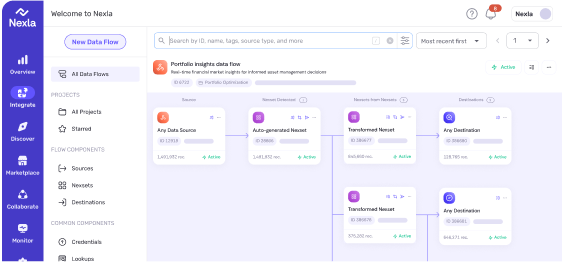
Nexla and Vespa.ai Partner to Simplify Real-Time AI Search Across Hundreds of Enterprise Data Sources
Nexla and Vespa.ai partner to simplify real-time enterprise AI search, connecting 500+ data sources to power RAG, vector retrieval, and AI apps.

Ineffective data management costs organizations around 15-20% of revenue loss, even after investing heavily in artificial intelligence (AI). Shifting to reusable and scalable data products from ad-hoc data projects ensures long-term business value.
However, with consistent, long-term value, data products also encounter challenges, such as becoming stale and inconsistent across disparate systems. Worse, these problems can often go undetected, making data products unreliable for scaling business operations or for use in downstream applications. This lack of reliability makes them counterproductive.
This is where the common data model (CDM) comes into play. CDM addresses these challenges by standardizing and structuring raw data from disparate sources into reliable and reusable assets, ensuring data consistency and integrity from the get-go.
This article will explore the importance, applications, and challenges of data products. It will also demonstrate how a CDM can overcome these challenges, ensuring data is standardized, scalable, and ready for modern business demands.
Data products are tools and applications that use data to deliver insights and predictions. A CDM provides an organized way of structuring data, ensuring accuracy and consistency across systems to establish a reliable data foundation. For example, a CDM provides a standardized language for data, eliminating inconsistencies that arise from different systems.
To fully understand data products, it’s important to acknowledge their key characteristics.
To accelerate business outcomes, data products can have a major impact as they help in quick decision-making, enhancing operational efficiency, and recognizing new profit-making opportunities. Their role can be observed in the following areas:
Meanwhile, data products have many advantages, but their implementation can cause some issues. Therefore, it is essential to acknowledge those pain points to maintain long-term value.
Data products, with all their benefits, often fall short in consistency and scalability. To overcome these critical issues, CDM provides a powerful solution by standardizing data.
CDM establishes proper and formatted standardized structures, or datasets, for common business entities such as consumers, transactions, and products, satisfying business needs. By introducing the concept of predefined schema templates and a centralised system, CDM decouples pipelines from source-specific constraints, encouraging generality and agility, facilitating easy maintenance and quick onboarding.
CDM not only provides the format but also enriches it with metadata and documentation for easy adoption, understability, and data discoverability. It tracks lineage and embeds metadata as part of the process, ensuring governance, transparency, and auditability, along with easy debugging and management.
It ensures that proper rules and protocols are followed by enforcing standardized verification rules across the board, including schema validation, data contracts, and standardized documentation. This retains the quality of the data and the trust of the user.
CDM has many applications in different domains where it aims to achieve consistency and reliability:
For your business to grow, you need to move beyond isolated datasets and adopt a unified approach. A common data model (CDM) provides this foundation by ensuring that your data is organized, governed, and ready to use.
Building AI-ready data products on top of this reliable foundation enables teams to make faster decisions and to create a scalable and future-proof data environment for sustainable growth.
Get Nexla’s CDM for building robust data products to unleash the power of your data assets.

Nexla and Vespa.ai partner to simplify real-time enterprise AI search, connecting 500+ data sources to power RAG, vector retrieval, and AI apps.

Nexla and Vespa.ai partnership eliminates data integration complexity for AI search and RAG applications. The Vespa connector delivers zero-code pipelines from 500+ sources to production-grade vector search infrastructure.

Reusable data products unify databases, PDFs, and logs with metadata, validation, and lineage to enable join-aware RAG retrieval for reliable GenAI applications.
